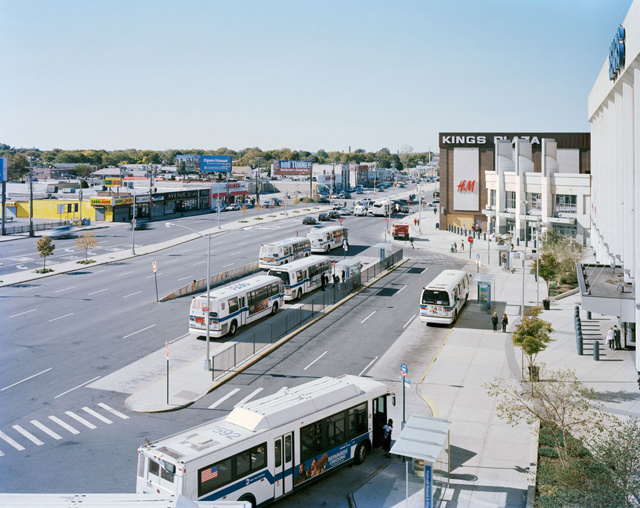Mossless in America is a new column featuring interviews with documentary photographers. The series is produced in partnership with Mossless magazine, an experimental photography publication run by Romke Hoogwaerts and Grace Leigh. Romke started Mossless in 2009 as a blog for which he interviewed a different photographer every two days; since 2012, Mossless magazine has produced two print issues, each dealing with a different type of photography. Mossless was featured prominently in the landmark 2012 exhibition Millennium Magazines at the Museum of Modern Art, in New York, and is supported by Printed Matter, Inc. Their forthcoming third issue, a major photographic volume on American documentary photography from the last ten years titled The United States (2003-2013), will be published this spring.
Advertisement

Brooklyn-based photographer Sean Stewart hails from the industrial city of Pittsburgh, PA. Stewart’s work is quiet and contemplative, and his subject matter is centered around contemporary American issues. His scenes depict everyday normalities: collapsed industry, identical prefabricated houses encroaching on sprawling plains, buses hastily pulling in and out of mall parking lots, and so on. But Stewart’s photographs are particularly arresting because they seem to be detached from the anxious mood these scenes elicit. They’re factual, clean, and seemingly objective, as if he is just hovering above them. We spoke with Sean about objectivity in photography, the decisive moment, and the importance of being part of a photographic community.Mossless: If you weren’t a photographer, what would you be doing?Sean Stewart: Ideally, I'd be a organic farmer. But it's more likely I'd probably be working in some massive, nondescript warehouse sorting your next Amazon order. If I hadn't found photography (or art in any other form), I wouldn't have met my wife or found friendship in the most unlikely of places. I'd probably live in a home located in the same zip code I grew up in. Every decision made has a ripple effect on what comes next.Do you always have a camera with you?No, I work with a large-format camera, which is impractical to carry everywhere. I don't own a car either, so usually I'm riding my bicycle to get around. This is probably when most of my visual, nonverbal thinking get done. It's a small thing, but there's a ton of mental and physical energy that goes into this activity. There's nothing that parallels the act of moving through the landscape without the aid of fossil fuels, and just being a witness to how the details change as you pass.
Advertisement
I live in Brooklyn, NY, yet most of my actual picture-making is done in Western Pennsylvania or on I-80 along the way. These shoots usually a take place a few weekends a month, during certain times of the year, or on week-long trips to more exotic places if I can manage the time. The camera usually stays in the trunk of the rental car until something wakes me up.What do you look for in a landscape before you raise your camera?I think light is the key in initiating a photograph. After light, I'm usually looking for a familiar detail. These details may have some cognitive relation to my childhood, or they can be about how patterns and visual relationships are organized in the frame. I always try to start out in a familiar place, trying to tap into memory, thoughts, and feelings about home. No matter the motivation, I try to not think about the scope of a project when I'm shooting. This can lead to too much self-editing and anxiety about the futility of a photography project. Let's shoot first and be artists and good photo editors down the line.Do you think pure objectivity is achievable in photography?Absolutely not. Photography is primarily concerned with manipulation over documentation, and lives somewhere in the middle.I get most of my visual ideas from watching films. These ideas take the form of a perspective or ways of seeing. I find it harder and harder to look at film and not think about the production crews, lighting equipment, and a table of doughnuts waiting in the sun. There are motives behind and in front of the camera, and entire economies built around them as well. The best films (Werner Herzog's Fitzcarraldo, for instance), come close to reaching objectivity. It's a raw illustration of human nature. But even then, since you are viewing the subject through an artistic medium, it will never be a fact. Terrence Malick comes close too. His films operate on so many emotions and fragmented memories of traumatic experiences. I'm glad I never went to film school, because all of the magic would have been destroyed for me.
Advertisement
I've always gravitated toward photography because it's an individual pursuit. The only objective experience is going out into the world and experiencing it first without a camera, and then somehow responding to these fragments in a real way. The photographs made are only imitations of that subjective experience and that light. They are not a fact or the experience itself. I'm attracted to images that have a blurry distinction between the illustration of a specific place and the idea of a fictional one.If you could change anything about the way photography is taught, what would it be?I would stop cheating young artists out of a future. I think there are a few overlooked paths to forging a professional life out of photography. The raising cost of higher education and the fact that so few jobs are available just doesn't add up for most people. If you really want to do something great, invest in your equipment, travel, and make work you really care about. There are technical concerns and philosophical hurdles to overcome that can't be done alone in a room, so surrounding yourself with artists and sharing work is extremely important. The internet is probably the most important tool to learn.Sean Stewart is a Brooklyn-based photographer.Follow Mossless magazine on Twitter and support their new book on Kickstarter.